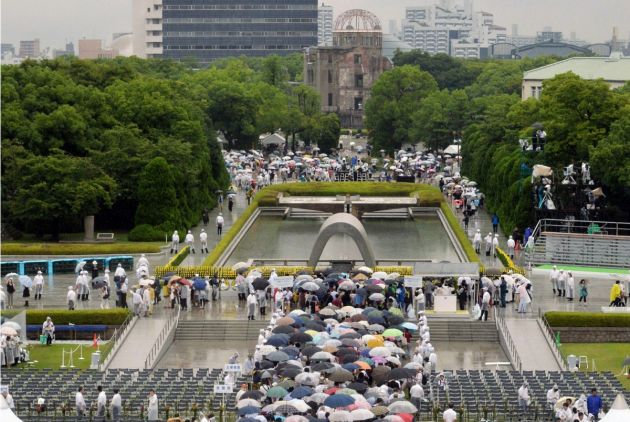Hiroshima and Nagasaki pilgrimage to seek action to end nuclear threats

A group from the World Council of Churches is to embark on a pilgrimage two the only two cities in the world ever attacked with atomic bombs – Hiroshima and Nagasaki in Japan.
A group of church leaders will travel to two cities devastated by the deadliest of weapons 70 years ago, then visit governments still willing to destroy thousands of cities in similar fashion today, the WCC said in a June 26 statement.
The 70th anniversary of the atomic bombings is a significant milestone," said Peter Prove, director of the WCC's Commission of the Churches on International Affairs. "It is timely because most of the survivors of the 1945 attacks are now in their 80s. Their cries of 'never again' must still be heard.
"It is urgent because the nuclear powers are all modernizing their nuclear weapons instead of abolishing them as promised. It is also hopeful because a growing international majority is forming to ban nuclear weapons and WCC member churches are involved."
The Japanese cities of Hiroshima was attacked by the United States on August 6, 1945 with an atomic bomb and three days later Nagasaki another city in south western Japan was were attacked with a nuclear bomb.
Twenty years ago Hiroshima Mayor Takashi Hiraoka called Sunday on the world to abolish nuclear weapons and attain peace as his city somberly observed the 50th anniversary of the dropping of the first atomic bomb on an inhabited area.
Japanese Prime Minister Tomiichi Murayama echoed the mayor's plea at the ceremony, while U.N. Secretary-General Boutros Boutros-Ghali urged the world to adopt a comprehensive nuclear test ban treaty
A lifetime after that fearsome destruction, 40 governments still rely on nuclear weapons. Nine States possess nuclear arsenals and 31 other States are willing to have the United States use nuclear weapons on their behalf.
Church leaders from eight of these countries will make the WCC pilgrimage to Hiroshima and Nagasaki, where they will listen to survivors, pray with local churches and reflect with other faiths on the plight of the two cities.
Then the bishops and church presidents will bring calls for action home from the two cities.
A key step is to urge their governments to join a new inter-governmental pledge to "close the legal gap" and establish a formal ban on nuclear weapons. This humanitarian initiative already has the support of 110 countries.
The WCC churches involved in the pilgrimage are well-placed to take a stand against the world's most destructive weapons, the council said.
"Their governments – the US, Germany, Japan, South Korea, Canada, Netherlands, Norway and Pakistan – all avow support for nuclear disarmament, but continue to rely on the very weapons that caused such destruction 70 years ago and pose a threat to humanity today," said the WCC.
Except for Pakistan, which has its own nuclear arsenal, all of these governments are prepared for the United States to use its nuclear weapons against their enemies.
"Four accept this Cold War-like posture as members of NATO. Two, Japan and Republic of Korea, do so as US allies in the Pacific. Churches from this group of countries are well-placed to apply ecumenical policy opposing nuclear weapons and exert constructive pressure on their governments today," said the WCC.
"Current events give this year's anniversary added significance. Rhetoric about nuclear weapons is being used in the crisis over Ukraine. And last month a major arms control conference at the United Nations collapsed amid strong nuclear-weapon-state resistance to the majority of states which support the humanitarian initiative against nuclear weapons."
The mission to Japan and the seven other nuclear-dependent countries is part of the WCC Pilgrimage of Justice and Peace.
Most of the church leaders on the pilgrimage are from nuclear-dependent allies of the United States.
"This pilgrimage will end by bringing a moral and spiritual critique of the dilemma that began with the attack on Hiroshima 70 years ago to governments that still depend on nuclear weapons today," said Dr. Isabel Apawo Phiri, WCC associate general secretary.
"The goal is to help foreign policy officials appreciate the unique opportunity at hand, namely, to align with the majority and promote the common good rather than perpetuate the dangerous, unjust and unstable status quo."